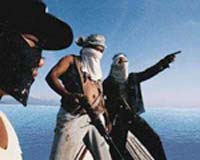| . |  |
. |
Berlin (UPI) May 14, 2009 The last-minute cancellation of a German mission aimed at freeing a freighter seized by pirates near Somalia has revealed competency and leadership problems in Berlin. The crew of the Hansa Stavanger, a German-owned freighter kidnapped by pirates off the Somali coast on April 4, may not even know that they were close to being freed. Some 200 officers from the GSG 9, an anti-terror special unit of the German federal police, had been on standby near the kidnapped vessel since the final days of April but were ultimately called back to Germany before a single shot was fired. They had been aboard the USS Boxer, an amphibious assault ship of the U.S. Navy, training for what would have become Germany's first active anti-piracy commando operation in the Gulf of Aden. With the mission, Berlin had wanted to reverse a strategy many experts say is inherently flawed. Germany has in the past freed hostages by paying large sums of ransom. As a consequence, Germans are seen as ideal targets for kidnappings and have increasingly moved into the focus of pirates as well as terror groups in Africa and the Middle East. Recently, French and American commandos have freed hostages from pirates, and the GSG 9 mission was aimed at handing Berlin a similar victory. But shortly before the operation could take place, German Interior Minister Wolfgang Schaeuble canceled it. One reason for the cancellation, the official saying goes, is that U.S. President Barack Obama's national security adviser James Jones denied final approval for the operation out of concern for the safety of the kidnapped sailors. Apparently, the pirates had since increased the number of watchmen present, making an attack of the ship too risky. This may very well be, but behind the scenes, security experts are speaking of serious competency problems that impeded, delayed and ultimately prevented the mission. When Germans are kidnapped, a crisis team forms in the Foreign Ministry; the GSG 9, however, which is best trained to free hostages, is under the leadership of the Interior Ministry. If the GSG 9 wants to use German military ships or planes -- which it has to, since it doesn't have its own long-haul planes or naval capacities -- it has to get a green light from the Defense Ministry. Naturally, this doesn't speed up missions that are about saving lives. "If Foreign, Defense and Interior (ministries) are quarreling and working against instead of with each other at a time when a special unit is awaiting orders thousands of kilometers away, then this ... is a problem for the national security," German newsmagazine Der Spiegel writes in its latest issue. On top of that, German Chancellor Angela Merkel, notorious for her cautious governing, has not yet come forward to take a leadership role. "If you don't take responsibility for such a mission, you can't be blamed if it goes wrong," a security expert who did not want to be identified told United Press International in a telephone interview. In the special case of the Hansa Stavanger, the mission was further undermined because the officer in command was located in Potsdam, near Berlin, thousands of miles from the scene. While the commander on the ground insisted the mission would succeed, the head official in Potsdam disagreed, Der Spiegel reports. Another special unit trained to free hostages -- the Kommando Spezialkraefte, a Bundeswehr commando unit known as the KSK -- is currently active in Afghanistan. But the KSK can't do policing and is allowed to operate only under a military mandate. Observers disagree on whether the European Union's anti-piracy mission Atalanta, of which Germany is a part, would qualify. Merkel and Schaeuble, the interior minister, are now calling for changing the constitution to allow the KSK to run such operations in the future. But that wouldn't solve the problem: The KSK may get easier access to German military equipment, but observers say its missions in Afghanistan leave no room for other short-term deployments. Moreover, a constitutional change will take months and may eventually fail. So as for now, it looks like Germany won't bother the pirates again anytime soon. "At the moment, it's unlikely that such a mission is being repeated," the security expert told UPI. Share This Article With Planet Earth
Related Links 21st Century Pirates
 Iran sends warships to fight Somali pirates: television
Iran sends warships to fight Somali pirates: televisionTehran (AFP) May 14, 2009 Iran has sent two warships to patrol the Gulf of Aden and protect its commercial vessels and oil tankers against attacks by pirates off the Somali coast, the state television website said on Thursday. Iran relies on oil tankers to deliver its crude oil to customers. "Two Iranian warships will arrive in the Gulf of Aden in the next two days and will remain in the territory for the next fi ... read more |
|
| The content herein, unless otherwise known to be public domain, are Copyright 1995-2009 - SpaceDaily. AFP and UPI Wire Stories are copyright Agence France-Presse and United Press International. ESA Portal Reports are copyright European Space Agency. All NASA sourced material is public domain. Additional copyrights may apply in whole or part to other bona fide parties. Advertising does not imply endorsement,agreement or approval of any opinions, statements or information provided by SpaceDaily on any Web page published or hosted by SpaceDaily. Privacy Statement |